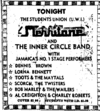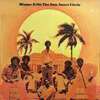Business Resilience: Inner Circle, an example of situational intelligence from the music industry.
Luck factor or resilience?
Inner Circle is a reggae band formed in 1968 by brothers Roger & Ian Lewis, joined by Touter Harvey in 1976. I had the honor of working with them in 2012-2013 to develop a show. In 2018, the band celebrates its 50th anniversary and continues to tour intensively.
However, this formation has been declared dead on several occasions throughout its history.
At a time when geopolitical, economic and health upheavals are forcing companies to navigate on sight, it is appropriate to share the secrets of the longevity of this group and to put its history into perspective with MJ De Marco's analysis of the 'luck factor' in his latest book 'Non Au Script' (Editions Contre-Dires, 2020).
According to him, the principle of process (choose, act and start again) and the action of shifting probabilities by modifying one's behaviour to attract luck allow us to modify our own universe.
Part I: not to waive
Inner Circle began by animating birthday parties and fairs, then the first contracts for clubs, posh hotels and chic restaurants arrived. Gradually the band became more professional, welcoming new and more experienced musicians to become one of the most prominent live bands in Jamaica.
It is a full-fledged company with a manager, a driver and logistics staff. Its business model is then that of the group interpreting the top 50 hits.
He also became a renowned backing band, playing for some of the biggest stars of the time, including Bob Marley & The Wailers.
But in June 1973 the majority of the musicians got tired of playing other people's music and left abruptly by creating the famous band Third Word. This was just one month before a festival organised in New York for which Inner Circle was hired to accompany all the guest singers! It is therefore necessary to urgently borrow musicians from competing bands and rehearse to be at the top. Which the Lewis brothers accomplish successfully in record time.
Back in Kingston, you have to start from scratch and regain customer confidence. A new line up is re-formed and a young street singer who is struggling to break through is hired: Jacob Miller.

Part II: Knowing how to get out of your comfort zone
Inner Circle resumed his business singing for tourists and private parties while, at the same time, Jacob Miller pursued a solo career in a more roots style. The status quo lasted until all these beautiful people flew to San Francisco in July 1975.
Inner Circle has to play for the greatest Jamaican artists invited to a festival. At the end of the 3 days of concerts, the artists return home except the band who is not paid. The Lewis brothers and Jacob Miller are condemned to play in bars and restaurants to pay their return ticket.
But this time, we have to put on a show! They realize they can create their own music by banking on Jacob Miller's talent to make him a star. They also meet the Rolling Stones as well as the bosses of Capitole Records who sign them to the label.


Part III: looking positively to act on this interpretation
Back in Kingston, Inner Circle is changing its business model from traditional clients to a new roots reggae company that is emerging worldwide.
The money is no longer going into the cash registers, and the first titles are not enough to pay the bills. Neighbours in their uptown neighbourhood find that the group is out of work and rumour has it that they can't stay because they can't pay the rent.
From this urgency, Jacob Miller & Inner Circle's biggest hit 'Tenement Yard' was born, a title that tells the story of this difficult but ultimately very creative period. Because Jacob Miller is a fundamentally positive person, he is never affected by events. And the Lewis brothers offer him unlimited musical support to express himself. This alchemy is going to turn the whole thing upside down.

Part IV: Learning from success and adversity
Inner Circle and Jacob Miller became the most popular artists in Jamaica with a series of unstoppable tracks and began touring abroad for Capitol Records. Alas, the label knew nothing about reggae and didn't know what to do with the band, which ended up playing at country and hard rock festivals. But their professionalism and their sense of showmanship acquired during private parties or in clubs allow them to convert any public to their cause.
Then they experienced a period of international fame with the signing to Island Records. They seem to be untouchable, create their own label and plan to set up their own studio. Jacob Miller becomes a very close friend of Bob Marley. In March 1980, they leave together for Brazil and even plan a joint tour...
Unfortunately, three days after their return, Jacob Miller died in a car accident. For Inner Circle, it's the end of the game and no one sees how the band could recover.
He tries to come back in vain and the years go by. No major label accepts demos anymore. Money is lacking, everything is gradually falling apart and creativity is not there. Yet we hang on and explore new ideas, some of which are put aside like the track 'Bad Boy' written in 1983. But nothing helps, new albums are constantly rejected by the labels.


Part V: Moving the odds in his favour to get lucky
Unable to finance studio sessions, Inner Circle buys an old mixing desk to record in a warehouse. It was damaged by soot due to a fire. Finally, by dint of persuasion, an album called 'One Way' was released in 1987. Not knowing what to do with the song, 'Bad Boy' was placed at the end of the album, which was a minor hit.
Shortly afterwards, an employee of a reality TV show in the making gives the producer the cassette of the album. The producer loves 'Bad Boy' which becomes the theme tune of the most watched TV show 'Cops' in the USA!
Bad Boy' sold millions of copies and the new album released by Atlantic Records won a grammy in 1993. The title even gives its name to the eponymous film by Will Smith and Martin Lawrence (1995).
In the meantime, another track called 'Make U Sweat' is released confidentially. It was finally remixed by Swedish DJs working for the Nordic branch of Warner Bros. and the band Ace Of Base. This version had an international impact and gave the band a second worldwide success under the name 'Sweat A La La Long'.
Part VI: Following your intuition as an alarm signal
Inner Circle makes millions of dollars but doesn't spend the money. Brothers Lewis & Touter Harvey know what it's like to lose everything.
Instead, they invest in a large Miami villa which they turn into recording studios. This complex became one of the most popular in Florida in the 2000s and all the greatest artists came to enjoy the facilities: Lady Gaga, Pharell Williams and Damian Marley among many others...


With hindsight, it can be said that resilience includes an element of luck if we consider that it is dependent on our actions.
According to JM DeMarco, we need to change our behaviour on several fronts: we need to adopt the behavioural habits that determine our universe (deciding to get rich, to train, to cultivate oneself is a matter of choice), act to shift probabilities, change routine, choose to see things positively and not to ignore our intuitions.
He cites the work of psychologist Steve Wiseman, who studied luck for many years and concluded that our behaviour can change luck if we mimic the characteristics of the lucky while eliminating those of the unlucky.
Jérôme Savoye
